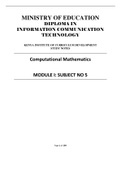Class notes
Class notes DIT 0204 (DIT0205)
- Course
- Institution
This book, for students TVET and up, hits the biggest soft spots most of today's students have. The problem with the mathematics curriculum used by most schools today is that students are given formula after formula to memorize and blindly use in problem solving. In this way, the students never lea...
[Show more]



